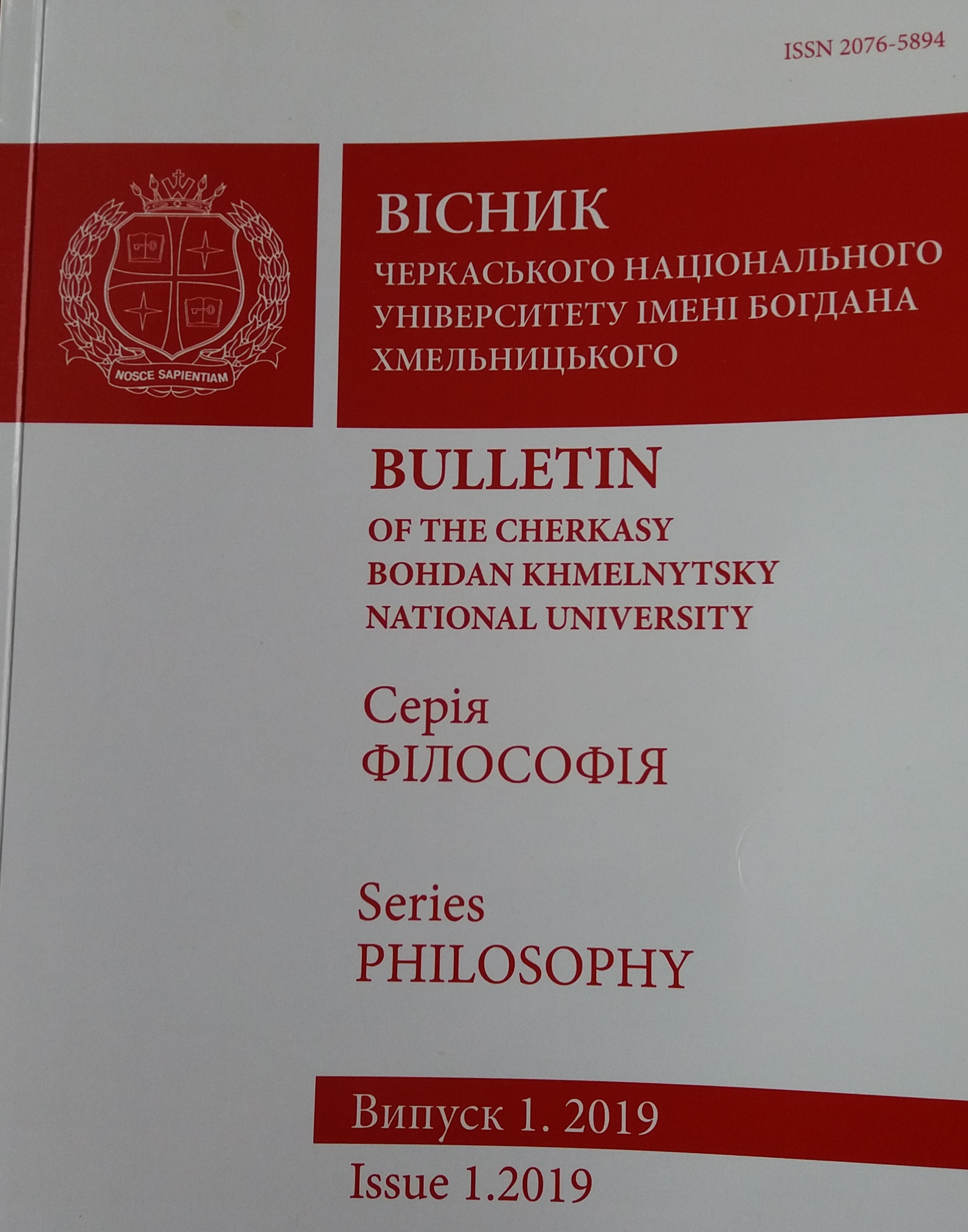LEGITIMATION OF HISTORICAL MEMORY
Main Article Content
Abstract
Summary. Introduction. For our country which once again found itself at the civilization crossroads of its historical development the issue of historical memory of the nation became extremely urgent. Under these conditions distinct trends of history rewriting are formed in the state policy of memory that actualized the problem of its legitimation.
The purpose of the article is explication of the heuristic potential of the discursive-ethical methodology of modern communicative practical philosophy for solving the needs or at least mitigating the whole complex of issues associated with legitimation of historical memory.
Methods. The phenomenon of historical memory is revealed on the basis of defining the content of the cognitive component in the structure of historical memory by referring to the methodology of knowledge sociology. Important vectors of its genesis and modern transformation are researched in the methodological horizon of the critical philosophy of history and methodological innovations of postmodernist historiology.
Results of the research. In the article it is presented that memory as knowledge about the past is inherent with dynamic nature which is the consequence of both natural forgetting process and purposeful state policy on history rewriting with the aim to use its legitimate potential because historical memory is the socio-cultural foundation of the living world, it is the source of individual and collective identity and a powerful factor in social integration and society consolidation. It is claimed that the updated (rewritten) history itself needs legitimation. However, the criterion of its legitimation can not serve to the full extent as a factor of truth in description of the events in the past because the historian's appeal to the past inevitably occurs from the perspective of his own subjectivity.
Novelty of the research results. It is proved that discourse-ethical methodology enables to harmonize such vectors as universal/contextual in the aspect of solving the problems concerning historical memory legitimation by means of achieving intersubjective understanding in the communicative process of all interested parties on the basis of compliance with a number of priori prerequisites for its organization.
Conclusions. Historical memory reveals the ability to function as a powerful lever for legitimizing of social institutions, social forms of life and state policy. However, on the other hand, it itself as a factor of spirituality needs legitimation not only because of history politicization – "memory conflict" of its carriers, but also due to the purely internal problems of historiography – the "memories conflict" having been generated in particular by its methodological innovations.Article Details
References
Blauberh, I. I. (1992). Henri Bergson and philosophy of duration. Collected Works, 1, 6-44. Moscow: Moscow Club (in Russ.)
Mannheim, K. (1994). Ideology and utopia. Diagnosis of our time, 7-276. Moscow: Lawyer (in Russ.)
Ricœur , P. (2005). Ideology and utopia. Kyiv: Dukh i Litera (in Ukr).
Ylyin, V. V. (2003). Philosophy of History. Moscow: MGU (in Russ.)
Kukartseva, M. A., Mehyll, A. Philosophy of history and historiology: verges of coincidence. Retrived from http://refdb.ru/look/1137605.html (in Russ.)
Dilthey, W. (1988). Sketches to criticism of historical reason. Voprosy filosofii (Questions of philosophy), 4, 135-152 (in Russ.)
Collingwood, G. R. (1980). Idea of history. Autobiography. Moscow: Science (in Russ.)
Foucault, M. (1996). Archaeology of knowledge. Kiev: Nika-Centre (in Russ.)
White, H. (2002). Metahistory: historical imagination in Europe of ХІХ century. Ekaterinburg: Ural University (in Russ.)
Rorty, R. (1996). Chance, irony and solidarity. Moscow: Russian Рhenomenological Society (in Russ.)
Blumenberh, H. (2000). The anthropological approach to the modern value of rhetoric. After philosophy: end or transformation? 371-402. Kyiv: Fourth Wave (in Ukr.)
Nietzsche, F. (1994). About truth and lie in non-moral sense. Philosophy in a tragic epoch, 254-266. Moscow: REFL-book (in Russ.)
Danto, Artur S. (2002). Analytical philosophy of history. Moscow: Idea-Press (in Russ.)
Hegel, G.W.F. (1990). Philosophy of Law. Moscow: Thought (in Russ.)
Ricœur , P. (2002). Right and justice. Kyiv: Dukh i Litera (in Ukr.)
Habermas, J. (1996). Communicative action and discourse. Sytnychenko L. Original sources of communicative philosophy, 84-90. Kyiv: Lybid’ (in Ukr.)
Tur, M. G. (2006). Nonclassical models of legitimation of social institutes: Monograph. Kyiv: PARAPAN (in Ukr.)
Apel, K.-O. (1999). Ethno-ethics and universal macro-ethics: contradiction or complementarity. Yermolenko, A.M. Communicative practical philosophy, 355-371. Kyiv: Libra (in Ukr.)
Berger, P., Luckmann, T. (1995). Social constructing of reality. Treatise on sociology of knowledge. Moscow: Medium (in Russ.)

